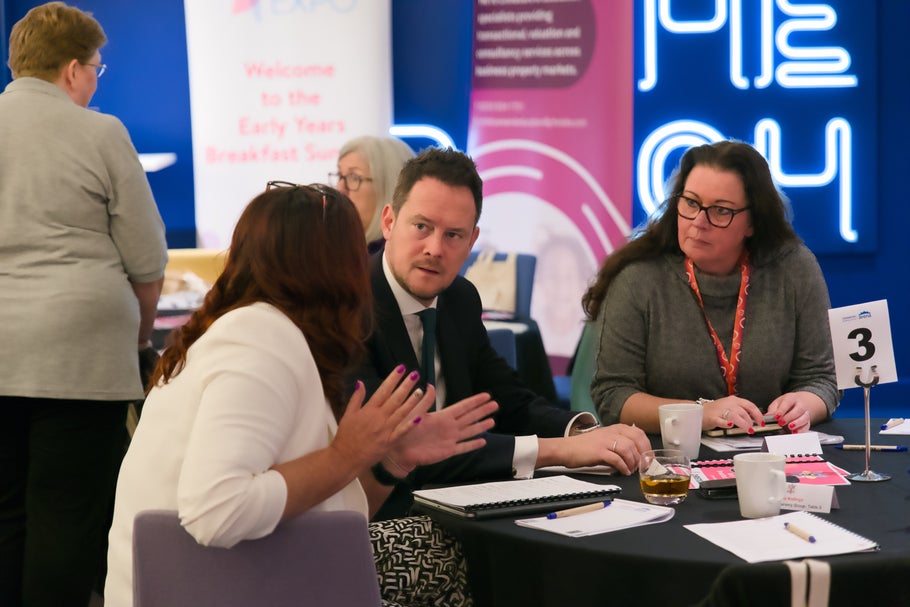childcare & education EXPO: Key takeaways from our VIP breakfast event
In this blog post, Courteney Donaldson (Managing Director - Childcare & Education, Christie & Co) shares an overview of the discussions held at the VIP breakfast event ahead of the childcare & education EXPO in Coventry.
Business. Built around You.
Your expert business property advisers

Courteney Donaldson
Managing Director - Childcare & Education

On Friday 27 September 2024, we were delighted to, once again, sponsor the childcare & education EXPO in Coventry and host a VIP breakfast on day one of the two-day event.
The VIP breakfast – which was attended by over 60 providers of all sizes and pedagogies - began with a market update and overview, during which I shared key findings from our Childcare & Education Market Insight Report. Alongside looking at activity and trends year to date, I spoke about the changes that we expect the new Labour government is likely to bring, the impact of the Conservative government’s extended entitlement initiative; the profile of nursery acquirers, their funding sources; shifts and rationale for the shift in trend from freehold to leasehold sales, as part of share sales and the September backdrop of activity in light of the upcoming October Budget, and the changes to tax and regulation that could be ahead.
We then opened discussion out to the room, to hear the views of delegates on key sector themes and hot topics. Here are some of the key points raised, which highlights the tone of discussion around the room…

What are providers seeing in terms of demand at the start of the new academic year, and where there has been heightened demand how are they creating extra capacity to meet parental demand for spaces?
- Some providers referenced that they were experiencing unprecedented level of demand for places, with some new registrations for babies already being booked as far ahead as September 2026
- Regarding supplemental costs, there was much discussion around how local authorities seem to be applying the guidance differently than the Department for Education stipulates
- Anecdotally, there was discussion around an increase in the number of parents returning to work and cutting maternity leave short so that they can access the funding due leading to an increase in demand for places for younger children
- It was cited that charity nurseries are cutting numbers, and local authorities seem to be saving money for wrap-around care rather than early years
- To create additional capacity some providers had successfully increased permitted capacities via new planning applications and applications for conditions associated to prior planning consents (specifically limiting operational capacities) to be redacted
What are the greatest challenges for recruitment that people are seeing?
- Many continue to experience challenges in recruitment and retention and there is further nervousness that these pressures are expected to heighten as a new provision is created within schools
- Challenges remain around attracting people into the early years workforce, retaining staff, and work/life balance for people, as well as a lack of recognition of the passion and professionalism in the sector
- There seemed to be a sense that talent isn't being developed and curated across the sector
- There are fewer students and apprentices in early years, and there seems to be a reticence to take them on
What key challenges are operators facing?
- County border issues were mentioned a lot, this regarding when a setting is in one county but a child lives in another, so neither county is willing to support
- The complexity of children’s additional needs is higher than it ever has been
- Increase in local authorities asking nurseries to keep school-age children with SEND where they don’t have suitable school places
- The 20-week window for ECHPs is being missed in a number of areas, it is a challenging process for parents with legal constraints and assessments. Some local authorities have almost put a stop on EHCP assessments
- There are challenges around if a child’s needs can’t be met in inclusive provision. If they can’t go through the battle of ECHP, many (it is estimated 76,000 parents) are self-funding their child in private schools. VAT on school fees being introduced may need an influx of ECHPs for these children
- Children with EHCPs are being asked to stay in a setting for an extra year, but neither suitable nor sufficient funding is not made available for early years settings
- Children with SEN are unable to be properly supported due to lack of support has an impact on other children in the setting
Following these discussions, we heard from Sara Bonetti, Interim Director at the Institute of Early Years Education, who explained how the institute could support the personal and professional growth of all aspiring and established professionals working in early education and care so the practitioners are recognised for the work they do and can take responsibility for their personal professional development.
There was a speech from the Minister for Early Education, Stephen Morgan, who said that he is determined to reset the Government’s relationship with the sector and to change things for the better. He spoke about recognising SEN needs before children start school so that they can thrive, the promise of primary school breakfast clubs in all schools, the commitment to 30 hours of funded childcare next year, a bidding round to support the expansion of 300 school-based nurseries, universal childcare from nine months, and increased support for parents to go back to work after having children.

We also heard from Catherine McLeod from Dingley’s Promise a registered charity passionate about giving every child with special educational needs and disabilities the best start in life. Catherine spoke about the latest research by the Early Years Alliance which revealed that 73% of settings say that there is a clear rise in the number of children with SEND needs. 28% of settings have turned SEND children away, and 92% of settings have stated that they have had to use their own funds to support children with SEND. Additionally, only 6% of local authorities believe they have enough provision for SEND children. The identified barriers to inclusion are insufficient funding, excessive paperwork, lack of staff, insufficient training, and long waits for therapists.
Catherine mentioned three main areas of recommendation for the government’s manifesto: Workforce development, simplifying funding and delinking disability access funding, and high needs block funding being moved to early years. She will be taking some issues forward for lobbying, such as the county border issues and the lack of funding for children with emerging needs.
Overall, it was a fantastic, insightful event that covered a number of really important topics, and we had some fantastic feedback from operators, including:
- “Really enjoyable and valuable event. I probably wouldn't come to the Expo without the wider business discussion the breakfast promotes, and the ability to discuss business issues with other providers, and maybe gain an insight into how the larger operators view things is immensely valuable.”
- “Wonderful event - thank you. Really valued the share and support too - great to be part of.”
If you want to discuss any of the above in more detail, please get in touch with Courteney Donaldson: courteney.donaldson@christie.com or +44 7831 099 985